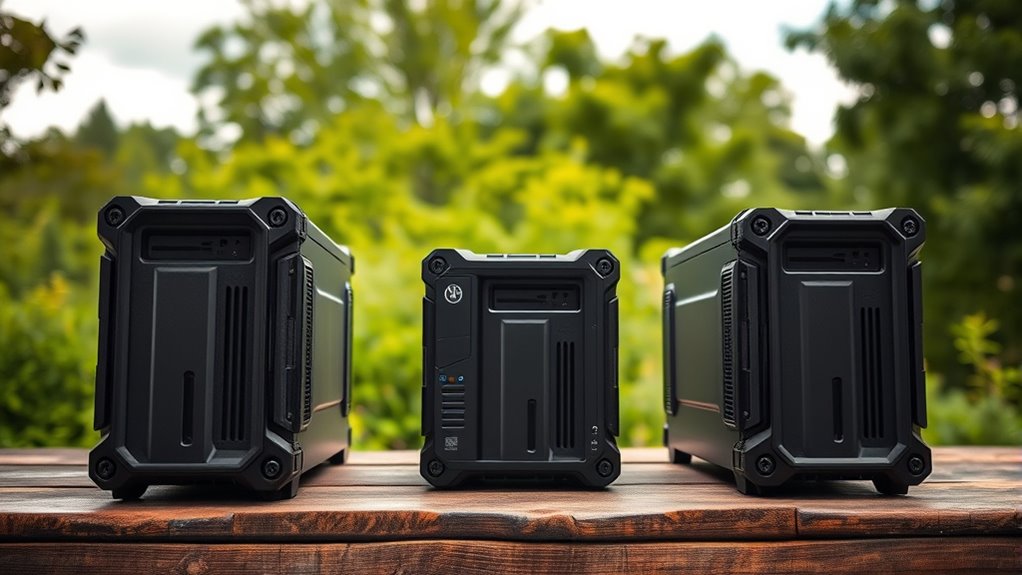If you’re looking for rugged NAS devices for your small business, I recommend options like the Buffalo LinkStation 210 for basic storage and the Yottamaster 1 Bay NAS for affordable, reliable performance. For demanding environments, the TERRAMASTER F8 SSD NAS and Gigastone SSD Drive offer speed and durability. For more advanced needs, QNAP’s rugged enterprise models provide high expandability and security features. Keep exploring the options to find the best fit for your growing enterprise.
Key Takeaways
- Rugged NAS devices with impact, water, and dust resistance ensure reliable operation in harsh environments.
- High-speed connectivity options like 10GbE and Thunderbolt support fast data transfer for growing business needs.
- Enterprise-grade models offer advanced security features including hardware encryption and user access controls.
- Expandable storage and RAID configurations provide scalable, redundant solutions for increasing data demands.
- Durable enclosures and wide temperature operation make these NAS devices suitable for industrial, outdoor, or remote locations.
BUFFALO LinkStation 210 2TB NAS Storage with HDD

If you’re a small business owner looking for a reliable and straightforward storage solution, the Buffalo LinkStation 210 2TB NAS is an excellent choice. It comes with a 2TB HDD and is designed as a 1-bay NAS, making it ideal for home or small office use. Easy to connect to your router, it allows shared network storage across multiple devices. It’s compatible with both Windows and macOS, and Buffalo provides 24/7 US-based support to assist with setup. Plus, its security features, including SSL encryption, help protect your data, while user-specific folder access keeps your files private and secure.
Best For: small business owners and home users seeking a reliable, easy-to-use network storage solution with data security features.
Pros:
- Simple setup and easy connection to routers for shared network access
- Compatible with Windows and macOS, supporting multiple device backups
- Built-in security features like SSL encryption and folder access controls
Cons:
- Limited to a single 2TB HDD, which may not suffice for large storage needs
- No RAID options or additional drive bays for scalability
- Basic features may lack advanced customization or enterprise-level functionalities
Yottamaster 1 Bay NAS Storage for 2.5 SATA HDD/SSD
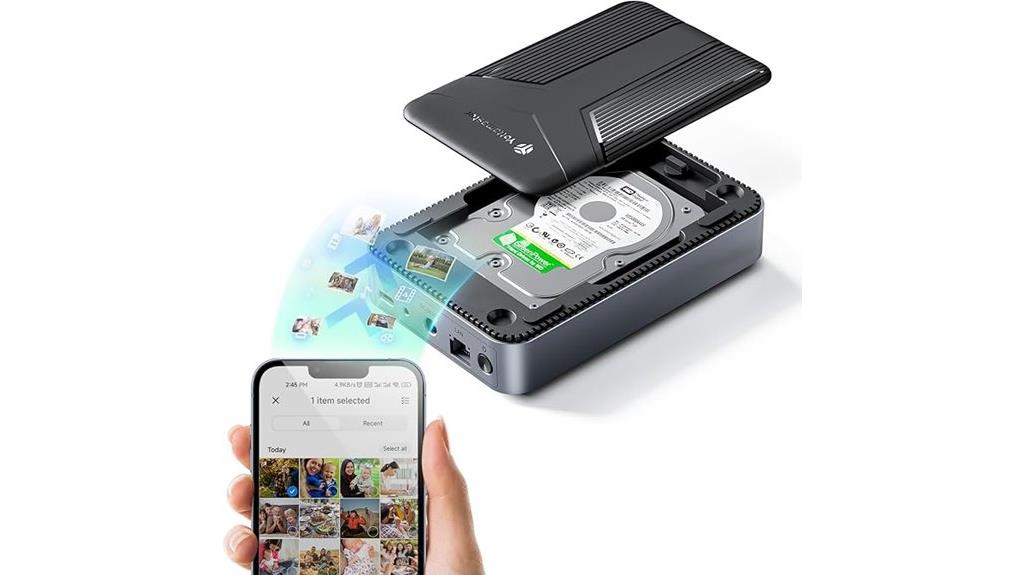
The Yottamaster 1 Bay NAS Storage is an excellent choice for small businesses seeking a simple, cost-effective private cloud solution. It supports up to 8 TB of data with a 2.5-inch SATA HDD or SSD, making it ideal for storing photos, videos, and files. Its diskless design lets you install your preferred drive easily, thanks to tool-free setup and magnetic cover. Powered by a quad-core ARM CPU and 1GB DDR4 RAM, it delivers solid performance. With fast local transfer speeds of up to 120MB/s, remote access, and compatibility across multiple platforms, it offers a reliable, secure, and flexible storage option for growing enterprises.
Best For: small businesses and home users seeking a budget-friendly, reliable private cloud storage solution with easy setup and cross-platform compatibility.
Pros:
- Supports up to 8 TB of data with a 2.5-inch SATA HDD or SSD, suitable for diverse storage needs
- Tool-free installation with magnetic cover simplifies setup and drive swapping
- Fast local transfer speeds of up to 120MB/s and broad compatibility across devices and platforms
Cons:
- Limited to a single drive bay, restricting expansion options
- 1GB DDR4 RAM may not handle heavy multi-user workloads efficiently
- Lacks advanced features found in higher-end NAS devices, such as multiple bays or extensive RAID support
TERRAMASTER F8 SSD NAS Storage (Diskless)
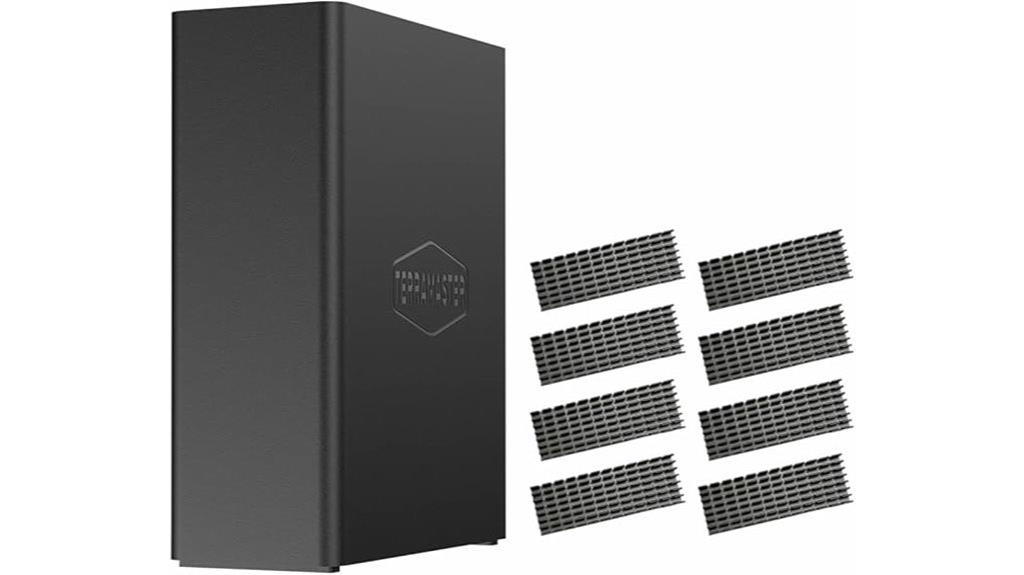
Designed for small businesses seeking high-speed, reliable storage in a compact form, the TERRAMASTER F8 SSD NAS Storage (Diskless) stands out with its all-SSD 8-bay design supporting up to 64TB of fast NVMe SSDs. Powered by an Intel N95 quad-core processor and 8GB DDR5 RAM, it delivers over 900MB/s transfer speeds and low latency. Its lightweight, portable build includes tool-free SSD installation, heat sinks, convection cooling, and silent fans for stable performance. With a 10GbE port and support for multiple OS installations, it’s ideal for demanding media, backups, and small business applications, offering high speed and expandability in a compact package.
Best For: small businesses, media professionals, and advanced users seeking high-speed, reliable, and portable SSD storage with expandability and robust performance.
Pros:
- Achieves over 900MB/s transfer speeds with low latency, ideal for demanding tasks.
- Compact, lightweight, and portable design with tool-free SSD installation and effective cooling.
- Supports multiple OS installations and extensive backup options, enhancing flexibility and data security.
Cons:
- Long RAID initialization times can delay setup.
- Interface pop-ups and minor software interface limitations may require user adjustments.
- Officially supports up to 16GB RAM, though some users have tested higher capacities successfully.
BUFFALO MiniStation Extreme Secure Rugged 1TB Portable HDD
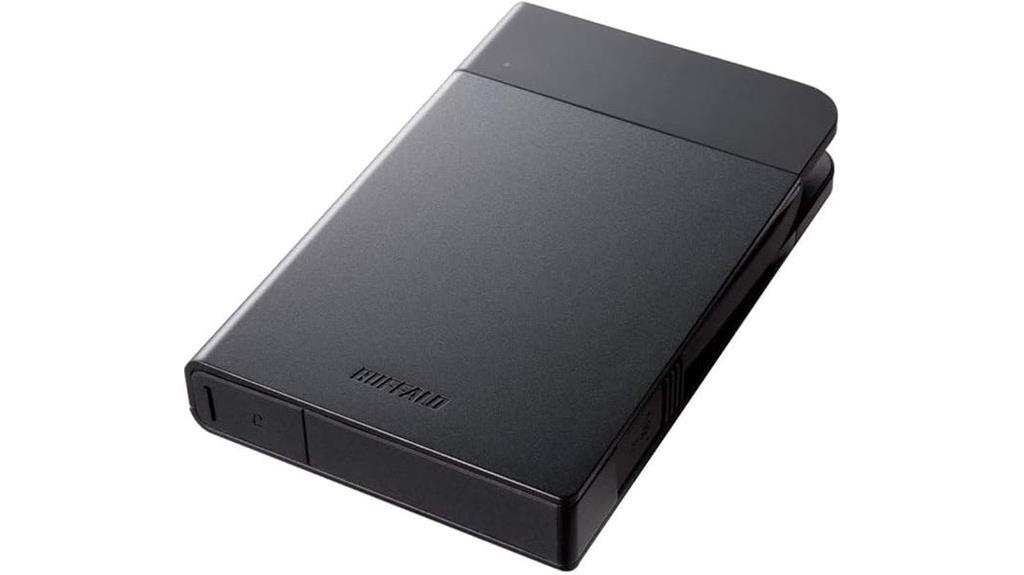
The BUFFALO MiniStation Extreme Secure Rugged 1TB Portable HDD is perfect for small businesses that need reliable data storage in tough environments. It offers a 1TB mechanical hard drive with USB 3.2, compatible with PC and Mac after formatting. Designed for durability, it withstands shocks, water, and dust, making it ideal for rough conditions. Security features include hardware encryption, password protection, and NFC access, ensuring your data stays safe. Its compact size, integrated USB cable, and robust build make it highly portable. Users praise its fast transfer speeds and reliable performance, along with Buffalo’s responsive support, making it a solid choice for demanding work environments.
Best For: small businesses and professionals needing durable, secure data storage in tough environments.
Pros:
- Rugged construction with shock, water, and dust resistance for reliable performance in harsh conditions
- Advanced security features including hardware encryption, password protection, and NFC access
- Portable with an integrated USB cable and compact design, ideal for on-the-go use
Cons:
- Initial setup or configuration issues reported by some users
- Compatibility problems with certain systems or operating environments
- Drive locking or security setting adjustments may require detailed instructions
Gigastone 4TB NAS SSD Drive
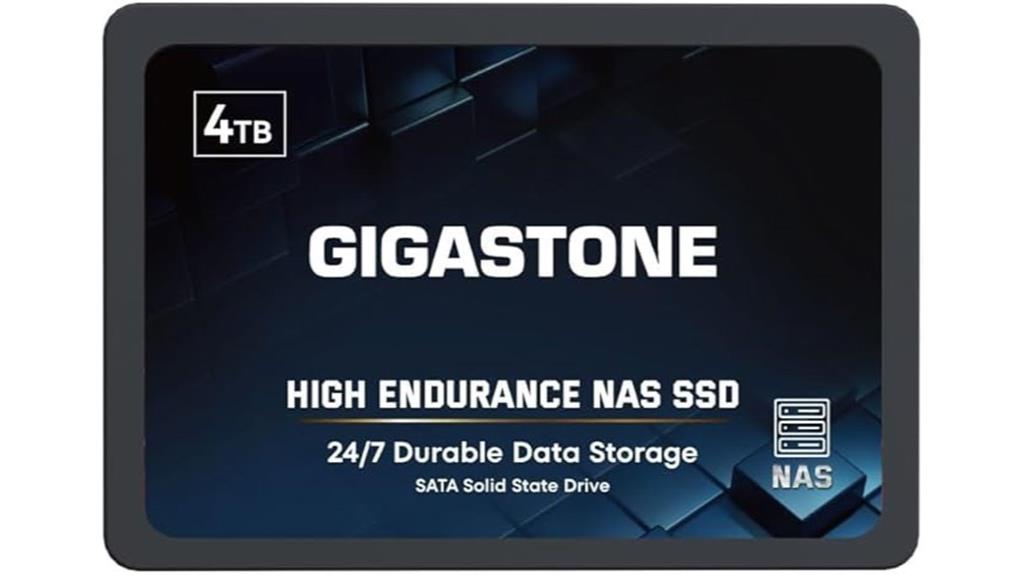
If you’re seeking a reliable, high-performance storage solution for your small business, the Gigastone 4TB NAS SSD Drive stands out. Designed for continuous 24/7 operation, it offers up to 530 MB/s transfer speeds with advanced 3D NAND Flash technology and SLC cache. Its high endurance makes it ideal for heavy workloads like virtualization, editing, and database management. Compatible with popular NAS brands like Synology and QNAP, it also works well with PCs, laptops, and PS4. Built for durability and data protection, this SSD provides reliable performance, easy integration, and a 5-year warranty, making it a solid choice for demanding small business environments.
Best For: small business owners and creative professionals needing reliable, high-speed storage for heavy workloads and continuous operation.
Pros:
- High transfer speeds up to 530 MB/s for quick data access and transfer
- Durable design with high endurance suitable for 24/7 use and intensive tasks
- Compatible with popular NAS systems, PCs, laptops, and gaming consoles like PS4
Cons:
- Not recommended for server or SAN environments, limiting certain enterprise applications
- Some users may face initial setup challenges like disk formatting
- Slightly higher price point compared to traditional HDDs for similar capacity
TERRAMASTER U4-500 NAS Storage (Diskless)

For small businesses seeking reliable, high-performance storage, the TERRAMASTER U4-500 NAS Storage stands out with its robust 4-bay, 1U rackmount design and enterprise-grade features. It’s diskless, giving you flexibility to choose your drives while supporting demanding workloads. Powered by a 12th Gen Intel Core i3 processor and 8GB DDR5 RAM, it handles multitasking effortlessly. With dual 10GbE ports and Hyper Cache technology, it delivers lightning-fast data transfers and efficient storage. Support for multiple RAID configurations ensures data security and easy capacity expansion. This device is built for business environments that need durable, scalable storage with top-tier performance.
Best For: small to medium-sized businesses requiring reliable, high-performance, and scalable network storage solutions with flexible drive options.
Pros:
- Enterprise-grade performance with a powerful 12th Gen Intel Core i3 processor and DDR5 RAM for smooth multitasking
- Fast data transfer speeds supported by dual 10GbE ports and Hyper Cache technology for quick backups and data access
- Flexible RAID options and online capacity expansion capabilities for data security and scalability
Cons:
- Diskless design requires purchasing compatible drives separately, adding to initial setup costs
- Larger rackmount form factor may not be suitable for small or space-constrained environments
- Advanced features may require technical expertise to configure and optimize effectively
QNAP TS-1655-8G-US 16-Bay High-Performance Hybrid NAS

Designed for enterprise-level demands, the QNAP TS-1655-8G-US stands out with its high-capacity 16-bay design and robust processing power, making it an ideal choice for small businesses that require reliable, scalable storage solutions. It features an Intel Atom C-5125 8-core processor with burst speeds up to 2.8 GHz, supported by 8GB DDR4 ECC RAM expandable to 128GB. With 12 x 3.5-inch and 4 x 2.5-inch SATA drives, dual 2.5GbE ports, and dual M.2 NVMe slots, it offers fast data transfer and caching. PCIe slots support high-speed network adapters, ensuring solid performance for demanding workloads and long-term enterprise reliability.
Best For: small to medium-sized enterprises seeking a high-capacity, reliable, and scalable hybrid NAS for demanding data storage and virtualization tasks.
Pros:
- High expandability with 16 bays and support for up to 128GB RAM, suitable for demanding workloads.
- Powerful Intel Atom processor with QuickAssist Technology enhances performance for encryption and compression.
- Dual M.2 NVMe slots and PCIe slots allow for fast caching, network upgrades, and application acceleration.
Cons:
- Outdated ZFS implementation may limit advanced features and optimal performance.
- Hardware upgrades, especially NVMe modules, can be sensitive and complicated to install properly.
- Support services have been criticized, which could affect troubleshooting and long-term assistance.
QNAP TS-i410X-8G-US Industrial NAS with Dual 10GbE and 8GB DDR4
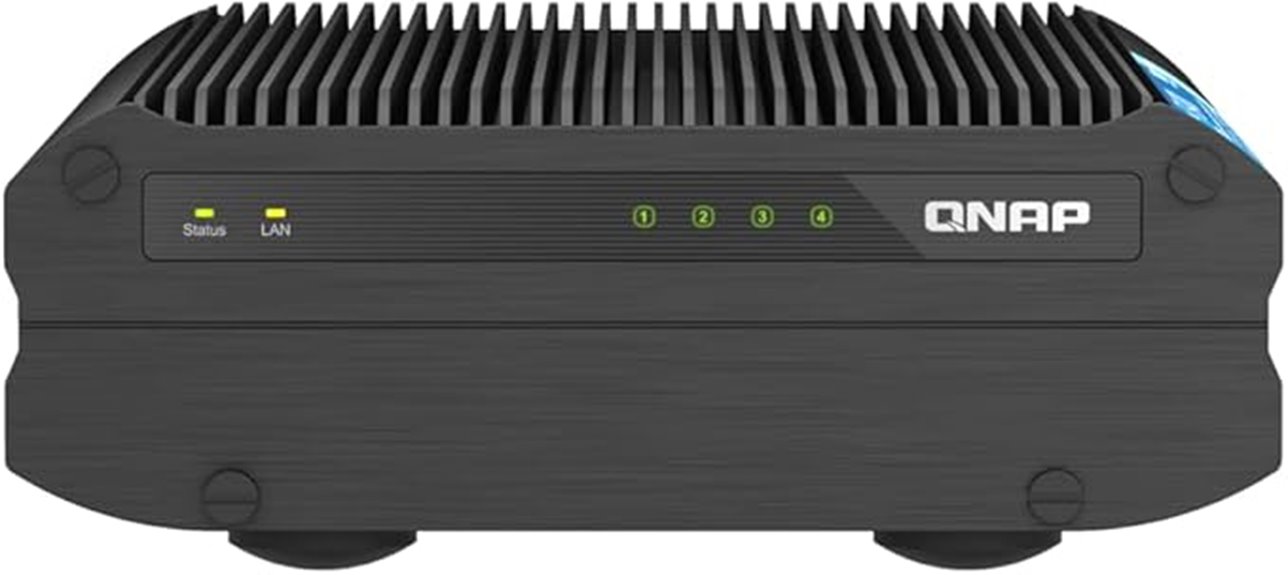
The QNAP TS-i410X-8G-US stands out as an ideal rugged NAS for small businesses operating in demanding environments, thanks to its dual 10GbE ports that deliver blazing-fast network speeds. Its fanless design and robust chassis support 2.5-inch SATA SSDs or HDDs, making it suitable for industrial settings. Powered by an Intel Atom x6425E processor and equipped with 8GB DDR4 RAM, it handles multitasking with ease. The device’s wide temperature range and durable build ensure reliable operation under extreme conditions. With 4K media support, HDMI output, and fast USB 3.2 ports, it’s perfect for high-performance virtualization, data sharing, and multimedia streaming in tough environments.
Best For: small businesses and industrial environments requiring rugged, high-speed network storage with robust multimedia and virtualization capabilities.
Pros:
- Dual 10GbE ports provide ultra-fast network connectivity suitable for demanding data transfer tasks.
- Fanless design ensures silent operation and enhanced reliability in harsh environments.
- Supports 4K media playback, real-time transcoding, and HDMI output for versatile multimedia applications.
Cons:
- Non-expandable 8GB RAM may limit performance for very intensive multitasking or large-scale virtualization.
- Limited storage capacity with only 4 bays, which might require additional units for extensive storage needs.
- Operates at a maximum temperature of 70°C, which could be a concern in some extremely hot industrial settings.
Factors to Consider When Choosing a Rugged NAS for Small Business
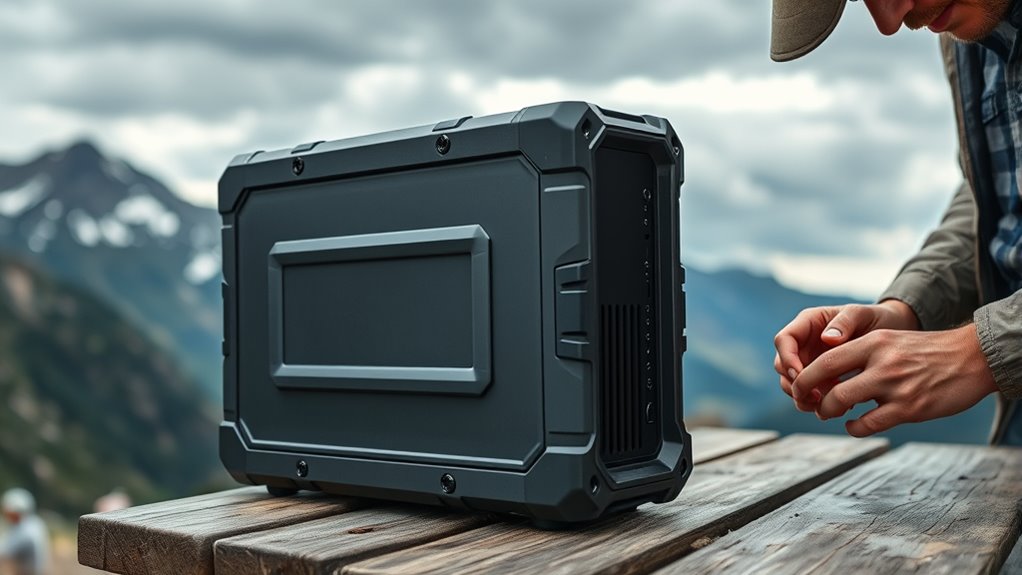
When selecting a rugged NAS for my small business, I focus on durability and resistance to guarantee it withstands tough environments. I also consider performance, storage options, connectivity, and security features to meet my specific needs. These factors help me choose a reliable device that keeps my data safe and accessible.
Durability and Resistance
Choosing a rugged NAS for your small business means prioritizing durability and resistance to harsh conditions. These devices are built with tough casings and shock-absorbing features that can handle drops, vibrations, and rough handling. Many models also have water and dust resistance ratings like IP67 or IP68, protecting internal components from environmental hazards. Good heat dissipation is essential, so they often include heat sinks, convection cooling, or silent fans to keep temperatures in check. Rugged NAS units are designed to operate reliably across a wide temperature range, typically from -40°C to 70°C, ensuring they work in extreme environments. Using impact-resistant materials and sealed enclosures, these devices prevent damage from physical shocks, vibrations, and exposure to the elements, making them ideal for challenging conditions.
Performance and Speed
To guarantee your rugged NAS delivers reliable performance, focus on its transfer speeds, processor power, and network capabilities. High-performance models can reach over 900MB/s for demanding tasks, so check the sequential transfer speeds. Look for multi-core processors, like quad-core CPUs, and at least 8GB of RAM to ensure smooth multitasking and data processing. Support for fast network interfaces such as 10GbE or higher is essential for rapid data transfer over the network. Additionally, evaluate drive interfaces and configurations—NVMe SSD support and RAID options help optimize speed and redundancy. Finally, ensure the hardware can handle intensive workloads continuously without overheating or throttling, maintaining consistent performance even under heavy use. These factors will help you select a rugged NAS that keeps pace with your growing business.
Storage Capacity Options
Selecting the right storage capacity for your rugged NAS depends on how much data your small business needs to store now and plans to expand into the future. Rugged NAS devices typically support between 1TB and over 64TB, determined by the number of drive bays and supported drive sizes. Many models accommodate 2.5-inch SATA drives, offering flexibility with SSDs or HDDs for expansion. The maximum capacity often hinges on the number of bays—for example, an 8-bay NAS can support up to 128TB with 16TB drives. Some models also support RAID configurations, which enhance data security and redundancy for larger storage needs. Always verify drive compatibility to guarantee peak performance and full utilization in rugged environments.
Connectivity and Ports
When evaluating rugged NAS devices for your small business, it is essential to prioritize models with multiple high-speed network ports like 10GbE or 5GbE. These ports guarantee fast data transfers and provide network redundancy, reducing downtime. Additionally, look for a variety of connectivity options such as USB 3.2, HDMI, and Thunderbolt, which enable versatile data sharing and seamless device integration. Support for dual or quad-port configurations allows for link aggregation, load balancing, and network segmentation, boosting reliability. Confirm the NAS works with Ethernet and alternative interfaces like fiber or serial ports, offering deployment flexibility in different environments. Finally, ruggedized connectors and weatherproof ports are vital for maintaining consistent connectivity in harsh, industrial conditions.
Security Features
Security features play a vital role in guaranteeing that your rugged NAS device keeps sensitive business data protected, especially in challenging environments. Hardware encryption and password protection are fundamental, preventing unauthorized access. Advanced options like NFC card access and biometric authentication add physical security layers, making it harder for intruders to breach the system. Support for SSL/TLS encryption ensures that remote data transfers are secure, safeguarding your information from interception or hacking attempts. Regular firmware updates and secure boot capabilities help patch vulnerabilities and maintain system integrity over time. Additionally, configurable user permissions and folder access restrictions give you precise control over who can view or modify data. These security features are essential for small businesses, providing peace of mind that your data remains safe and compliant.
Power and Operating Environment
Choosing the right rugged NAS for your small business means paying close attention to its power and operating environment. You’ll want a device that supports a wide temperature range, typically from -40°C to 70°C, so it can handle extreme conditions. A durable, weather-resistant enclosure is essential to protect against water, dust, shock, and vibration. Compatibility with industrial power supplies and voltage inputs, like 9V-36V DC, ensures reliable operation even with unstable power sources. Features like fanless cooling or convection design help the NAS run smoothly in high-temperature or dusty environments. Additionally, check for certifications such as IP ratings or MIL-STD compliance, which confirm the device’s suitability for industrial or outdoor use. These factors help ensure your data stays safe and accessible under challenging conditions.
Compatibility and Expandability
Selecting a rugged NAS that meets your small business needs involves ensuring it can grow with your operations. I look for models supporting various drive types and sizes, like 2.5-inch SATA HDDs, SSDs, or NVMe drives, to allow flexible storage expansion. Compatibility with my existing network is essential, so I prioritize devices with high-speed ports such as 10GbE or multi-gigabit Ethernet for scalable connectivity. I also check if the NAS offers multiple drive bays and RAID options to enhance data redundancy and future growth. Seamless integration across different operating systems matters too, so support for SMB, NFS, or AFP is a must. Finally, I consider hardware expansion options like PCIe slots or USB ports for adding network cards, storage controllers, or peripherals as needed.
Frequently Asked Questions
How Do Rugged NAS Devices Perform in Extreme Environmental Conditions?
Rugged NAS devices excel in extreme environmental conditions, I’ve found. They’re built with tough materials and sealed against dust, water, and shocks, ensuring reliable performance even in harsh settings. I’ve used them outdoors, in dusty warehouses, and during power surges, and they consistently deliver stable data access. Their durability means less downtime and worry, making them ideal for small businesses needing dependable storage in challenging environments.
What Is the Typical Lifespan of a Rugged NAS in a Small Business Setting?
The typical lifespan of a rugged NAS in a small business setting is around five to seven years. I’ve found that with proper maintenance and careful handling, these devices can last even longer. Rugged NAS units are built to withstand wear and tear, ensuring reliable performance over time. Regular updates, backups, and environmental precautions help maximize their longevity, making them a smart, sustainable storage solution for growing businesses.
Are Rugged NAS Devices Compatible With Existing Network Infrastructures?
Yes, rugged NAS devices are compatible with most existing network infrastructures. I’ve found they usually support standard network protocols like SMB, AFP, and NFS, making integration straightforward. They work seamlessly with Ethernet-based setups and often include features like PoE and dual LAN ports for added flexibility. I recommend checking the specific device’s specs, but generally, these rugged solutions are designed to fit into diverse network environments easily.
How Do Rugged NAS Devices Handle Data Redundancy and Backup?
Rugged NAS devices handle data redundancy and backups effectively by supporting RAID configurations like RAID 0, 1, or 5, which protect against drive failures. I’ve found they often include built-in backup options or integrate seamlessly with cloud services for additional security. This way, your data stays safe, even in tough environments. Regular backups and redundancy features give me peace of mind knowing my business data is protected.
What Are the Maintenance Requirements for Durable NAS Storage Solutions?
Maintenance for rugged NAS storage solutions is fairly straightforward. I check the device regularly for firmware updates to keep everything secure and running smoothly. I also clean the vents and connectors to prevent dust buildup, which can cause overheating. Backups are scheduled automatically, but I verify them periodically to ensure data integrity. Overall, with some routine checks, these systems stay reliable and ready to support my business needs.
Conclusion
Choosing the right rugged NAS can truly transform your small business’s data resilience and mobility. But with so many options, how do you know which one is the perfect fit? The key lies in understanding your specific needs and future growth. The right device could be your toughest, most reliable partner—waiting silently to open new opportunities. Are you ready to make that vital choice and take your enterprise to the next level?
